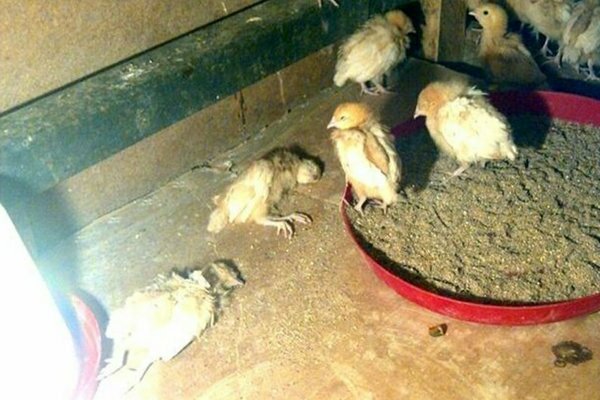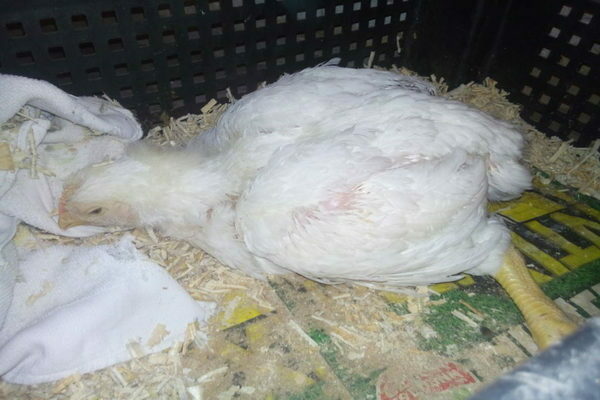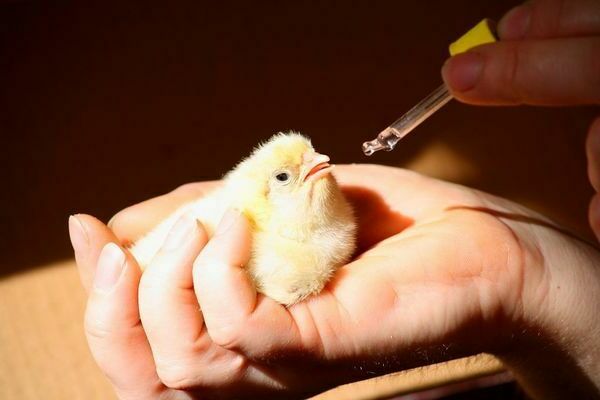Baytril for chickens: instructions for use
Content:
Baytril is a drug that kills viruses that infect the digestive tract and respiratory system of birds. Baytril is especially useful for chickens.
Its effect on the body of young chickens will be discussed in this article.
When is Baytril used for chickens

Chickens and young chickens are most often susceptible to viral disease. It is necessary to take care of increasing their immunity.
Colibacillosis
This is the most dangerous disease. It increases chick mortality by up to 30%. The virus enters the body through water, food and contaminated premises.
Symptoms of the disease:
- plentiful drink;
- lack of appetite;
- blue beak;
- diarrhea.
Salmonellosis
Symptoms of the disease:
- lack of appetite;
- lethargy;
- feathers are lost;
- release of foam;
- dirty cesspool;
- diarrhea with mucus and blood.
This disease can be transmitted to humans through eggs. Mostly sick chickens die. Survivors develop poorly and look sickly.
Pasteurellosis
This disease affects young chickens aged 75 to 125 days. Contact with infectious birds is a sure condition for infection, as well as with pets. Dirty equipment and bedding can also be a source of contamination.
Important! Cows, piglets and rabbits can get sick with Pasteurellosis.
The disease occurs in an imperceptible form, therefore, a month after the disease, a general pest of birds may begin.
Symptoms of the disease:
- heat;
- dull plumage, disheveled;
- heavy breathing with wheezing;
- the release of foam from the mouth;
- drooping gait.
Ulcerative enteritis
The cause of this disease has not yet been identified. Reoviruses are believed to be the cause of the disease. Chickens are most often sick from 14 to 50 days from the date of birth.
Symptoms of the disease:
- lethargy, head and wings droop;
- the stools are dry and have a dark appearance, sometimes with blood.
With a chronic disease, young animals die from loss of strength, despite the fact that the appetite is good.
Streptococcosis
This disease has two forms: acute sepsis and chronic, when the chicken itself is a carrier.
Symptoms of the disease:
- stiffness of movements;
- retardation of attention.
Chickens can die very quickly.
The causative agent of the disease is streptococci. The embryos are also susceptible to infection. The bacteria can be in the inventory, in the food. It is necessary to monitor their purity and a sufficient amount of vitamins in the feed, as well as check for any skin damage.
Did you know? Chickens with a narrow pelvis do not rush.
Staphylococcosis
The disease is similar to that of cholera.
The disease occurs if the staphylococcus bacillus penetrates through the damaged skin. Also, the bacillus can enter through the digestive system. Once in the body, the bacillus will begin to develop inflammation. The incubation period is from several hours to 5-6 days. The disease can develop very quickly, then the chicken dies immediately. With a chronic course, the joints are affected.
Symptoms of the disease:
- lethargy;
- lack of appetite;
- diarrhea;
- slimming;
- ruffled feathers;
- hyperemia of the pharynx;
- cyanosis of the scalp;
- paresis.
Mycoplasmosis
The cause of the disease is careless content. The incubation period is 17-20 days. Chickens can become infected in the embryo. The main sources of infection can be:
- Earth;
- grass cover;
- excrement.
Mycoplasmosis affects the lungs and air sacs.
Infection symptoms:
- discharge of mucus from the nose;
- sneezing;
- hoarse breathing;
- cough;
- Red eyes;
- swollen eyelids;
- lack of appetite;
- weakness;
- liquid excrement.
Important! Eggs are laid only in light.

Baytril for chickens: instructions for use

If the disease is caused by microplasmas, then, depending on the age of the broilers and their purpose, the following dosages are prescribed:
- From 1 to 3 weeks - 50 ml per 100 liters of water.
- With 3 weeks for breeding and 1 to 5 weeks for eggs, the same dosage is required.
- From 4 and 6 weeks of age, the dose should be increased to 100 ml per 100 liters of water.
- For older birds, a dosage is applied at the rate of: 10 mg per 1 kg of chicken weight.
The treatment lasts 3-5 days. With salmonellosis - 5 or more days.
The drug Baytril for broiler chickens should be given from two weeks of age.
Important! An overestimated dose of the drug or a lack of drinking should not be allowed.
A solution of the drug in water should be given as a drink. The healing solution must be given a new one every day to avoid complications.
It should be borne in mind that the drug Baytril for broiler chickens is excreted from the body after 11 days. Before this period, it is impossible to give meat for food.
Baytril for broiler chickens: contraindications for use

It is not always possible to give Baytril to broiler chickens. This is in such cases:
- The period when chickens can lay eggs.
- Other antibiotics are used in parallel in birds.
- Do not feed the drug two weeks before slaughter.
It should be noted that under the action of a strong antibiotic, which is Baytril for broiler chickens, the following may appear:
- diarrhea;
- allergic reaction;
- pain in the gastrointestinal tract;
- weakness;
- lack of response to other stimuli.
Did you know? The color of the eggs depends on the age of the hen, on the feed used, on the light and air temperature.
Bytril for chickens: precautions
- No smoking or drinking.
- Wash hands with soap and water after finishing work.
- If the drug gets on the skin or into the nose and throat, rinse the affected areas with a strong stream of water.
- The use of empty containers is prohibited. It must be disposed of.
Thus, the farmer cannot do without medicines when breeding poultry.

Baytril for broiler chickens: video about the drug




